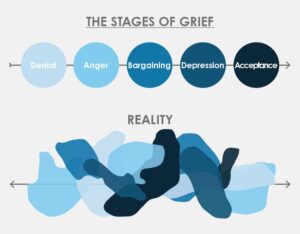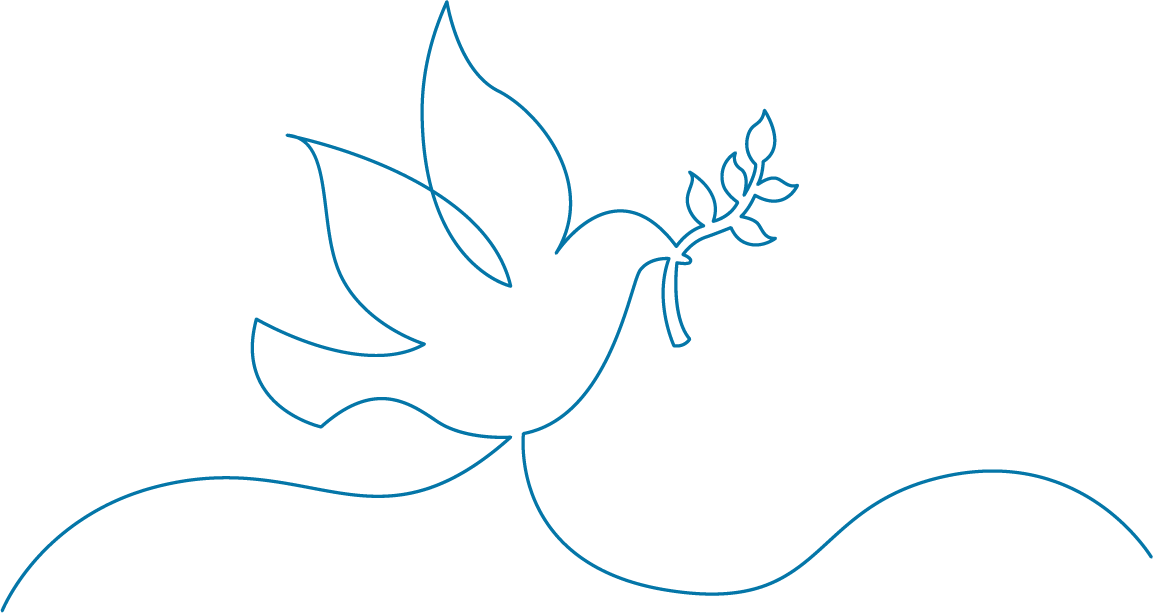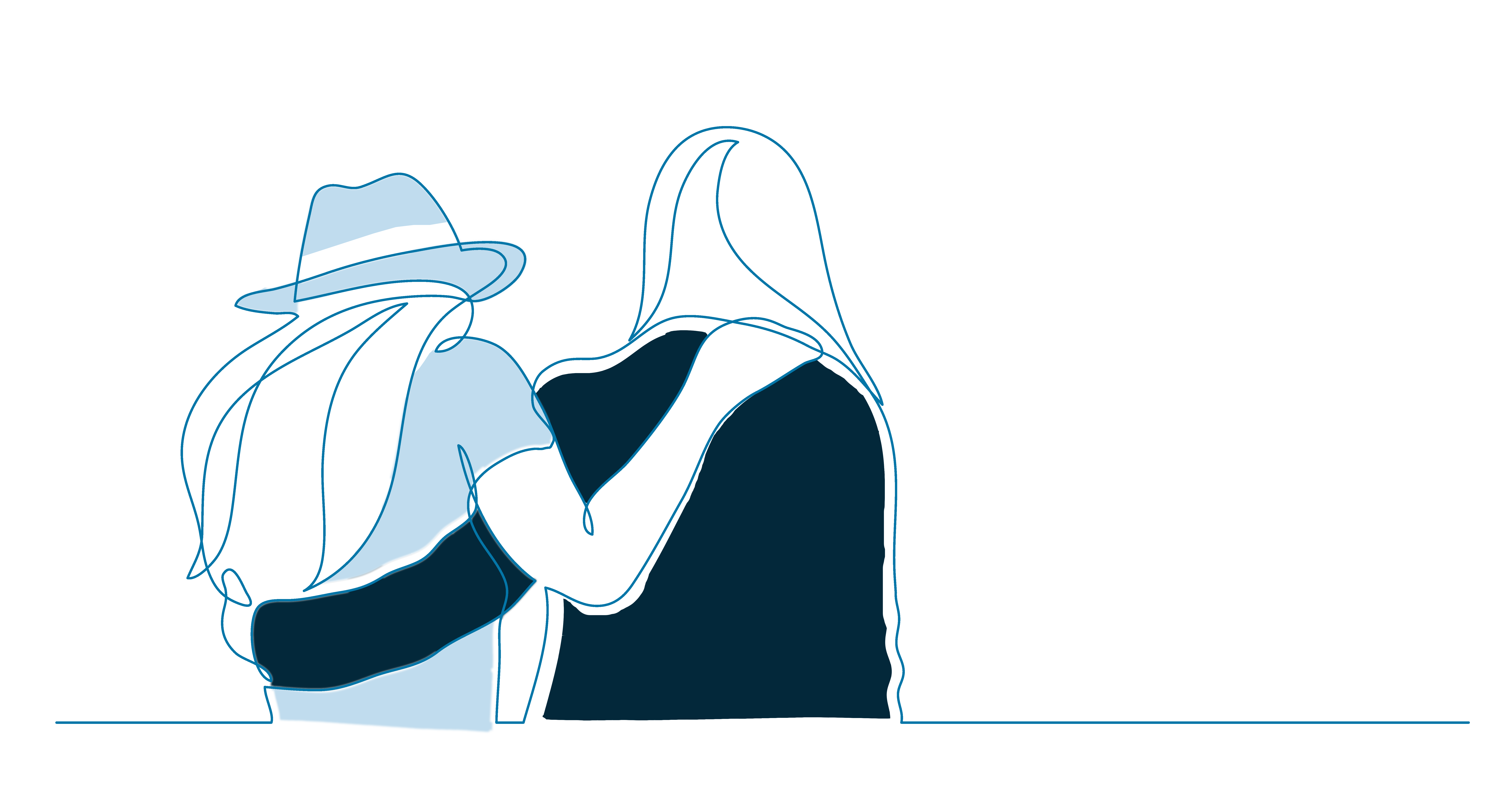The Grieving Process
 The grieving process is unique to every one person; however, while there is no "normal" way to grieve, giving yourself time to grieve should be the one constant in every grieving process. Consider this not as a step-by-step process, but as a helpful guide to keep track of where you are in this journey. You may see that though you are alone in your personal grief, you are not alone in that others are grieving, too. Perhaps some are even grieving alongside you.
The grieving process is unique to every one person; however, while there is no "normal" way to grieve, giving yourself time to grieve should be the one constant in every grieving process. Consider this not as a step-by-step process, but as a helpful guide to keep track of where you are in this journey. You may see that though you are alone in your personal grief, you are not alone in that others are grieving, too. Perhaps some are even grieving alongside you.
Just as no two people grieve the same way, not all losses have the same impact. There are losses that may just need a little time adapting to, and others that seem too heavy a burden. Unfortunately for the latter, there are some losses that seem beyond our ability to cope with. It is in these moments that you may need company, someone to listen, someone who truly cares about your hurt. You don't need their advice, just their ear and their shoulder at this time in your life.
The Stages of Grief
The following stages of grief were outlined by Elisabeth Kübler-Ross, first as a five-stage model, and later as a seven-stage model. Each stage will include a brief description to help you put a name to your grief. The word 'stage' implies that it's something you move through, but remember this:
- There is no right place to start. For example, the first stage of grief is only a suggestion that it is what you will experience first.
- You can, and likely will, experience more than one stage at the same time.
- In some cases, you will revert to a stage you've felt previously. That is okay. This is not a step-by-step process.
Shock
A stage mentioned in the seven-step process is shock. It is an intense, and sometimes paralyzing, surprise at the loss. This is not always the first stage someone experiences, and you may never experience shock depending on your situation. Understand that shock can either come with a loss of a loved one or the news of their imminent illness.
If this is how you feel, whether in part or fully, allow yourself time to rest and process the information you are faced with. Surround yourself with loved ones or find a place where you can be alone. We all process this feeling differently.
Denial
The first stage in the five-stage model, and second in the seven-stage model, is denial. For some, this is their first response to loss and may be the stage that is revisited more frequently. It is a defense mechanism to protect you from the immediate shock of the hurtful situation, and if whatever has happened has shaped your new reality, experiencing denial at any stage in the grieving process is completely normal. If you find yourself looking for evidence that confirms your loss, you may be experiencing denial.
"Denial can actually be a kindness at times... Distraction is a healthy coping strategy. Remember to show yourself kindness."
— Megan Devine, It's OK That You're Not OK
Anger and Frustration
The next stage to expect is anger and/or frustration. Feeling intensely angry might surprise you or your loved ones, but it is not uncommon. This anger serves a purpose. Try reminding yourself there is pain underneath the anger. Even if it may not feel like it, this anger is necessary for healing.Keep your anger healthy
Unhealthy anger can end a life or a relationship. If you are having difficulty handling your anger:



Bargaining/Testing
Bargaining from the five-stage model and testing from the seven-stage carry the same pattern of thoughts and emotions. They both help you hold onto hope in these intense situations. You may try to bargain with God or the universe to bring things back to how they were, for just one more moment with your loved one, or even to take their place. Testing is similar in that you may begin experimenting with your new situation to discover what it actually means in your life.
Both of these are helpful in the grieving process, but remember, you do this your way. No one can tell you how to bargain with or test your situations. No matter how you process these stages, there is no such thing as a normal way. You have your normal and that is what will work for you.
Depression
 This is a familiar feeling for those experiencing loss — it does not always indicate a mental health condition. In the beginning of a loved one's declining health, you could be too busy getting everything in order to have time to process this new reality and how it will affect you. This realization may lead you to feel intense sadness and despair. Remember that depression in this case of loss is a very natural and appropriate response to grief.
This is a familiar feeling for those experiencing loss — it does not always indicate a mental health condition. In the beginning of a loved one's declining health, you could be too busy getting everything in order to have time to process this new reality and how it will affect you. This realization may lead you to feel intense sadness and despair. Remember that depression in this case of loss is a very natural and appropriate response to grief.

Acceptance
The final stage in the five-stage model is acceptance. This isn't necessarily about being okay with what has happened. You may never feel that way. Acceptance is more about how you acknowledge the losses you've experienced and how you learn to live and adapt with them.
Decision
Instead of acceptance, you may embrace a decision stage instead. This could stem from a rise in optimism about what has happened and finding ways to manage in this new reality. Most have trouble recognizing that surrender is a viable option for them because they do not differentiate surrender from giving up.
Give Up
phrasal verb with give verb
to lose hope:
"Life has been so difficult after they passed. I want to give up."
Surrender
verb
to find hope and live in peace:
"There's nothing I can do to bring them back and they wouldn't have wanted me to live this way, so I surrender."

Integration
This is the last stage in the seven-stage model. Acceptance is part of this process, but it's when you reflect on your grieving journey and step into the world as a renewed person that it becomes integration. If we believe happiness, peace, love, joy or any other desirable outcome can be achieved tomorrow, then we begin to believe there is no reason it can't be achieved today. When integrating your decision to surrender or fight, understand that while some things can wait for a decision, others should not. Do not be afraid of surrender nor the decision to do so. Integrate your decision as soon as you know it is the right one for you to make.Seasons of Life
 You may discover that it is better to have different friends, even family, than be in a relationship that only brings you down. Whatever is coming your way, the way you grieve will likely change as well. Life events such as anniversaries, birthdays, and annual family traditions like reunions, cultural honoring of ancestors and so on will be processed differently for you from this day forward. If you lost your loved one during a season of family celebrations, your initial grief will be different than if it had occurred on just another day.
You may discover that it is better to have different friends, even family, than be in a relationship that only brings you down. Whatever is coming your way, the way you grieve will likely change as well. Life events such as anniversaries, birthdays, and annual family traditions like reunions, cultural honoring of ancestors and so on will be processed differently for you from this day forward. If you lost your loved one during a season of family celebrations, your initial grief will be different than if it had occurred on just another day.
Or, you may have lost your loved one on one of these "just another" days and you're approaching one of these celebrations. Your feelings of grief may begin to flood over you again. Be sure to give yourself the time to grieve. It's perfectly acceptable and may end up being an annual thing for you. Be good to yourself and allow these moments to come and grieve the way you need to.
The Holidays
Grieving during the holidays would seem obvious to most, but there are others who get blindsided when these seasons approach after losing someone. It can be especially difficult when your loved one passes during this season of life. The traditions you carried with your loved one will be missed immediately.
You may put your grief on hold because of the busy season, or it's the busy season that you put on hold because of your grief. Either way, do what you must do to grieve appropriately. As time passes, do whatever works best for you for future holidays, too. It will vary per person, and whether you continue the old traditions you did with your loved one, or start a new tradition, that is completely up to you. Do whatever you must to build your new reality.
Seasonal Grief
Each of the four seasons can have an impact on how one grieves. It will be different for each individual, so you should not let others tell you how you should grieve or say things that suggest the time of your loved ones passing was the best season for it to happen in. Everyone has different feelings for these moments, so whether it be summer, winter, autumn or spring, you must be allowed to feel your own emotions regarding the changing of seasons.
Cultures and Religions

There are many cultures in the world, a lot of which have found a place in the United States. Each one reacts to death and funerals differently than the others. Keep in mind that just because you grew up in a certain culture, it doesn't mean your grieving will look like those who are from your culture or belief system.
Culture is simply "shared beliefs and assumptions (that) interact with shared values and produce shared norms that drive shared patterns of behavior" (Egan, 2010, 2014; The Skilled Helper).
Dr. Gerard Egan explains that there are variations to culture, for each person will develop their own personal culture based on the culture they were brought up in, their own personality, and the society that had influenced them. This is why it's important to grieve your own way. There is no right or wrong way to this—there is your way, and for you, that is the right way.
References
- Kübler-Ross, Elisabeth, & Kessler, David. (2000). Life Lessons. New York, NY: Simon & Schuster Publishing Company.
- Kübler-Ross, Elisabeth. (1969). On Death and Dying. London, Eng: MacMillan Publishing Co., Inc.
- Devine, Megan. (2017). It's OK That You're Not Ok. Louisville, CO: Sounds True, Inc.
- Egan, Gerard. (2010, 2007). The Skilled Helper (9th ed.). Boston, MA: Brooks/Cole, Cengage Learning.
- McRay, Barrett W., Yarhouse, Mark A., & Butman, Richard E. (2016). Modern Psychopathologies: A Comprehensive Christian Appraisal (2nd ed.). Downers Grove, IL: InterVarsity Press.


